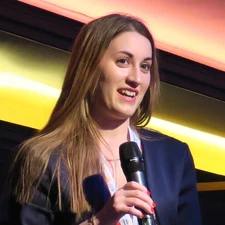Natasha L. S. Jeffrey

ST Solar-Terrestrial Sciences
The 2018 Division Outstanding Early Career Scientist Award is awarded to Natasha L. S. Jeffrey for her outstanding achievements in improving the standard model of fast electrons produced in solar flares, thereby eliminating the long-standing low-energy cut-off uncertainty.
X-ray observations are a direct diagnostic of fast electrons produced in solar flares, energised during the energy release process and directed towards the Sun. A cold thick target model has been ubiquitously used for this task, since it provides a simple analytic relationship between the accelerated and the emitting electron spectra, with the latter quantity readily obtained from X-ray spectrum. However, due to the low-energy cut-off uncertainty, the total electron acceleration rate or flare power has not been possible to infer from X-ray spectra for about fifty years. The use of a more realistic model, properly accounting for the properties of the flaring plasma, and the collisional diffusion of electrons eliminates the long-standing low-energy cut-off problem of the cold thick target model. Natasha Jeffrey’s simulations were instrumental to show how the new model solves the challenge and to constrain the electron acceleration energetics in flares.
Although Jeffrey obtained her PhD degree in December 2014, her work has already achieved unprecedented respect in the scientific community. She was invited to present tutorials at international meetings for experts and to give several invited/plenary talks.
Her illustrious work to popularise solar plasma physics is of special note. Jeffrey organised six workshops talking about how astrophysicists learn about stars from their light. Over the past 4 years she gave an impressive number of interactive presentations to encourage young people to study physics and astronomy.
